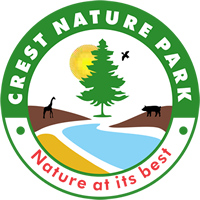The vision and mission of Crest Nature Park (CNP) emphasizes its great potential for research, learning and training in nature conservation; trado-herbal medicine practices; environmental studies; field experimentation, agro and agro-related practices; and in recreation and tourism. Indeed, the Park is a raw material store house and a field laboratory for research scientists and trado-herbal medicine practitioners.
CNP is uniquely blessed with a 500-acre land with interesting topography and potential park activities. CNP could to be developed to a world centre of excellence. If properly developed to full potential, a lot could be achieved in the Park for the benefit of humanity.
This is the reason we seek assistance and partnerships from governments, individuals and organizations in form of capacity building, financing, materials sourcing and expertise.
Some specific areas of opportunities for assistance and partnership in capacity building and perfection are as follows:
- In Fauna and Flora Conservation
Generally, CNP undertakes conservation and preservation of fauna and flora with emphasis on its beautiful ecosystems and topography (including monkeys and bush pigs). These would provide interesting opportunities for tourists, research scientists and trainers, to contribute to the Park.
- In Herbal Medicine Development
With the growing global awareness of the benefits of herbal medicine, CNP plans for major activities in this sector. A herbal medicine research Centre is being developed for this purpose.
CNP would engage biological and wildlife scientists as well as other conservation centres in propagation, multiplication and supply of necessary plant seedlings.
CNP would provide for mutual benefits, opportunities for natural, physical and environmental scientists, native doctors and analytic laboratories e.g. National Agency for Food and Drug Administration and Control (NAFDAC) to collect plant specimens for their assignments/activities.
- In Preserving Plants Going Into Extinction
Many valuable plants going into extinction in Africa are receiving little or no attention. Many of these plants have very high cultural, medicinal, economic and even esthetic values e.g. Chlorophora/Milicia excelsa, Okoubaka aubrevillei, Enantia chlorantha/polycarpa, Erythrophleum guineense etc. Such species are being preserved at CNP and many will be purchased from other sources, even from outside Nigeria.
We genuinely need support for sourcing these species.
- In Economic Plants Preservation/Cultivation and Multiplication
Nigeria was a world centre for export of hardwood, especially to Europe. For example, it is known that many of the chemical and pharmaceutical production vats in Europe were constructed from Nigerian Iroko (Chlorophora/Milicia excelsa) trees (source – Boots UK) because such vats were not reactive to acidic and alkaline media even at high temperature.
Today Iroko hard timber is almost sliding into extinction, and other such valuable species as Mansonia, Techtona grandis are now very scarce.
CNP is now raising seed and propagation nurseries for such plants for the benefit of individuals and organisations that would want to plant them.
- In Environmental and Climate Change Control
A major trending global concern today is climate change and a popular climate change control measure is afforestation and green park development for environmental oxygen enrichment, carbon-dioxide reduction and general air cleaning. This is why even in the heart of cities in the developed countries, streets are planted with trees and many areas are adorned with green parks.
It is not substantially so in Africa.
Apart from CNP’s beneficial green park, we would produce necessary seedlings for tree planting in cities
- In Field Experimentations
CNP has interesting landscape and several water bodies (streams and rivers). Thus, it would be a good place for teachers (and lecturers) to educate their students about nature. It is also an ideal place with numerous natural facilities (such facilities include – water bodies, soil types, temperature shades, topography etc.).
for field experimentations which some universities or organisations could hardly boast of. Researchers could be allocated sites within the Park for controlled experimentations.
- Agricultural Practices
CNP is a veritable training ground for entrepreneurs in several agricultural practices. It has facilities to train entrepreneurs in organic tree crops cultivation(especially Oil Palm for which it developed 150 hectares), piggery, fishery, apiary, and organic farming.
CNP also train on organic vegetable production. Its prioritised organic vegetable production include:
- Telfairia occidentalis (fluted pumpkin)
- Gongronema latifolium (utazi)
- Ananas comosus (pineapple)
- Andropogon citratus (lemongrass)
- Citrullus lanatus (watermelon)
- Zingiber officinale (ginger)
- Ocimum gratissimum (scent leaf)
- Curcuma longa (turmeric)
- Agaricus bisporus (mushroom)
- Cucumis sativus (cucumber)
- Aloe barbadensis miller (aloe vera)
- In Agro Processing
CNP also has facilities to train entrepreneurs on:
- Honey production and purification
- Palm oil milling
- Palm kernel cracking
- Palm kernel crushing to kernel oil
- Fish drying
- Cassava processing
- In Recreation, Tourism and Film Production
The topography in CNP is spectacular. With the natural endowment and available facilities, including a Holy Trinity Temple on ground, CNP could easily be developed to a world centre for recreation, tourism, religious activities, conferences/retreat centre and a film-making camp. Certainly, stakeholders have loads of roles to play here.
In conclusion, it is obvious that CNP has a very wide scope for exciting recreation, research, training and tourist activities. However, to harness the full potential and maximise the benefit of this laudable project, various expertise are required to perfect present and future plans of the Park.
We look forward to having you onboard.
Thank you.

